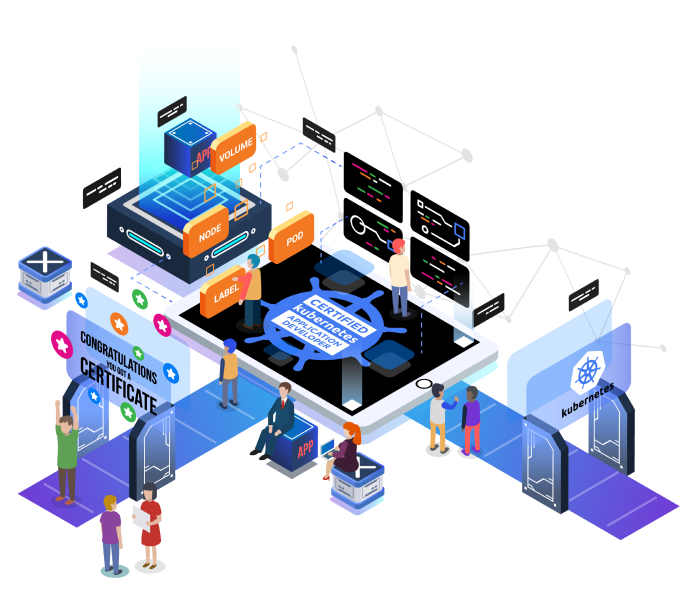Jenkins
Il corso è finalizzato ad insegnare come utilizzare Jenkins, partendo dall’installazione dello stesso fino ad arrivare alla gestione quotidiana e alla stesura di Pipeline che permettono integrazione con Docker e/o Kubernetes.
COD: DSK207
Categorie: Kubernetes

Metodologia didattica
Il corso prevede laboratori didattici in cui ciascuno studente potrà lavorare ai fini di portare a termine esercizi formativi che forniranno esperienza pratica nell’utilizzo dello strumento, per ciascuno degli argomenti affrontati durante il corso.
Prerequisiti
- Conoscenza base comandi linux
- Conoscenza base sistema operativo linux
- Conoscenze discrete su sviluppo del software
- Conoscenza base docker e kubernetes
- Conoscenza base editor di testo su terminale (vi,vim,nano)
Al termine del corso i partecipanti saranno in grado di:
Teoria
- Comprendere l’architettura di Jenkins
- Comprendere i vari workflow di Jenkins
- Comprendere l’utilizzo di articats e fingerprints
Pratica
- Installare Jenkins su VMs
- Eseguire build su Jenkins
- Gestire la security in Jenkins
- Parametrizzare le builds
- Configurare le Pipelines
Programma didattico
- Building in Jenkins
- Building from SCM
- Working with Artifacts and Fingerprints
- Security in Jenkins
- Parameterizing Builds
- Build Triggers
- Building a Jenkins Pipeline
- Deploying a Docker Container with Jenkins Pipelines
- Deploying to Kubernetes with Jenkins Pipelines
Durata – 1 giorno
Erogazione – in Aula, On Site, Remoto
Requisiti PC e SW:
- Connessione Internet
- Web browser, Google Chrome
- Zoom
Lingua
- Formatore: Italiano
- Laboratori: Inglese
- Slide: Inglese
Il prezzo di questo corso della durata di un giorno è di € 750 + IVA.
Containerd Introduction
-Familiarity with the Linux operating system
-Proficiency in the operating system command line
Kubernetes Introduction
-Basic knowledge of Linux CLI
-Knowledge of basic concepts of containerization and how containers work.
Kubernetes Core Architecture
-Basic knowledge of Linux operating system and command line concepts
-Understanding of the basics of virtualization and containerization
Kubernetes Resource Management
-Completion of DSK101 and DSK102 courses or equivalent knowledge
-Basic knowledge of Kubernetes and container orchestration.
Kubernetes Install, Configure and Manage
-Completion of DSK101 and DSK102 courses or equivalent knowledge
-Basic knowledge of Linux
Kubernetes Application Management
-Familiarity with basic Kubernetes concepts
-Experience with the command line
Helm
-Good knowledge of Kubernetes
-Good knowledge of YAML/JSON
Kubernetes Storage
-Good knowledge of Kubernetes
-Good knowledge of YAML/JSON
Prometheus and Grafana
-Good knowledge of YAML/JSON
-Knowledge of monitoring systems
ELK
-Good knowledge of YAML/JSON
-Knowledge of at least 1 programming language
Jenkins
-Fair knowledge of software development
-Basic knowledge of docker and kubernetes
Elastic Kubernetes Service
-Basic knowledge of AWS public cloud
-Basic knowledge of text editor on terminal
Kubernetes for vSphere
-Basic knowledge of Kubernetes
-Basic knowledge of vSphere
FluxCD
-Basic knowledge of Kubernetes
-Basic knowledge of Git
Kubernetes Install and Configuration
-Concepts of containerization and container orchestration
-Principles of TCP/IP networking and the HTTP protocol.
Kubernetes Advanced Networking
-Experience configuring Kubernetes
-Networking knowledge
Kubernetes Security
-Familiarity with cybersecurity
-Experience with systems and network administration
Kubernetes Scheduler
-Basic knowledge of TCP/IP stack
-Basic knowledge of text editor on terminal
Istio
-Basic knowledge of the YAML language
-Familiarity with microservices architectures
Kubernetes Troubleshooting
-Basic knowledge of linux operating system
-Basic knowledge of TCP/IP stack
CKA Exam Prep
-Completion of CKA learning path
CKAD Exam Prep
-Completion of CKAD learning path
CKS Exam Prep
-Completion of CKS learning path












